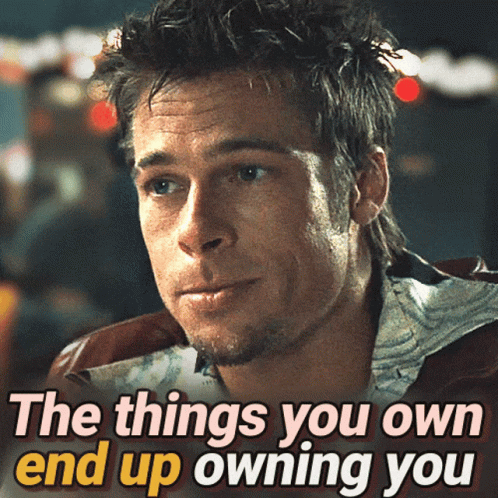America is suffocating beneath a rising floodtide of junk. One quarter of our garages have now been claimed by the growing hoard, leaving no room for any cars. One tenth of American households have overflowed their homes and resorted to renting storage units. We trick ourselves by squirrelling our stuff away out-of-sight and out-of-mind, putting off a reckoning with the true horror of our inventories until moving day, when we ruin the weekends of our friends and family. Shepherding these swirling galaxies of debris though our lives comes at a terrible price. And not just in money. The time we spend searching for inevitably-misplaced items among the chaos will amount to hundreds of days, adding insult to financial injury.
Our hoarding problem is only a few generations old. It all started back in the 20s, when the nephew of Sigmund Freud arrived on Madison Avenue to preside over an unholy marriage between the advertising industry and the burgeoning field of psychology. Up until that time, advertising tended to be informational in nature. A typical billboard might read “dried goods and sundries sold here”. But by weaponizing the science of psychology, marketers found they could persuade us to buy products we didn’t need by manipulating unconscious desires. DeBeers and Listerine are famous examples of this vintage. This was the time that department stores and mail-order catalogs installed Christmas into the national psyche as an annual buying ritual. The timeless, nostalgic feel of their ad copy masked the fact they had only just invented our “traditions” for us. America only has 3% of the world’s children, but we buy 40% of the toys consumed globally. People’s feelings for their children and grandchildren are quintessential to our humanity, but forging a link between these feelings and the ring of a cash register is a deliberate and underhanded tactic. America’s problem with too much stuff is the result of these kinds of nefarious advertising strategies.
The problem is fundamental to our economic system. We, as a nation, are stuck trying to sell ourselves more and more junk each year because of the way that our economy is structured. The private owners of our companies call all the shots, and they are mainly concerned with increasing the value of their property. The way they generally achieve this is by increasing the volume of business these companies are doing. Our national production apparatus is oriented around never-ending growth. Even though our homes are overflowing with junk, we still send our best and brightest minds to Madison Avenue, where they sit around and think of new and innovative schemes for cramming even more products down our throats. It’s become utterly exhausting. An economic system that promotes and relies upon expansion was just the thing for 19th Century America. Back then, there was a whole frontier (whose previous occupants had been conveniently genocided) filled with the potential for new farms, ranches, mines, timber operations, etc. But we are living in a 21st century context now. If we can’t find a graceful way to step off of this infinite growth escalator, we’re going to drive ourselves crazy and potentially destroy our habitat in the process.
Awareness is the key to solving the problem. Like most businesses in America, our media is privately-owned. So of course, they seek to forestall discussions about the liabilities of that particular economic structure. They are therefore incapable of helping us to diagnose the mounting problems that structure is causing us. It’s making them less relevant to us by the day, but we probably still have a long way to go before public awareness reaches any kind of critical mass. In the meantime, we can at least insulate ourselves from some of the worst effects of pernicious marketing by raising our individual awareness. Avoiding media that is designed to stimulate buying behaviour is a good place to start. Coldy parting with any junk that you haven’t actively used in the past 12 months might be another good idea. Since conditioning people to project emotions onto lifeless objects is a reliable way to sell them, pruning our hoards will come with some emotional resistance. Keep that in mind.
As always, dear reader, these essays can only serve to raise awareness. It’s both their limitation and their greatest power. I hope to see you back next week!






Feels to me like this is one if those places where our evolved minds are slaves to our lizard brains. There's a huge amount of psychological comfort that comes with living in excess. And surrounding ourselves with disposable junk is a cheap way to scratch that itch.
This was excellent and well written. Anybody can start rethinking how they choose to live. It starts with one day, when you are holding an item in your hand. Ask your self do I really need this and will I remember it in 12 months.